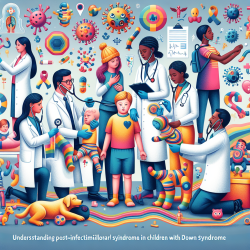Introduction
In the ever-evolving landscape of pediatric healthcare, understanding the unique challenges faced by children with Down syndrome is crucial. Recent research highlights a significant post-infectious inflammatory syndrome associated with SARS-CoV-2 in pediatric patients with Down syndrome. This blog delves into the findings of the study titled "Post-infectious inflammatory syndrome associated with SARS-CoV-2 in a paediatric patient with Down syndrome" and explores how practitioners can leverage these insights to improve outcomes for their patients.
The Study: Key Insights
The study, published in BMJ Case Reports, presents a unique case of a three-year-old girl with Down syndrome who developed a post-infectious inflammatory syndrome after a SARS-CoV-2 infection. This condition led to cerebrovascular accidents (CVA) and inflammatory cardiac lesions, highlighting the potential for severe post-infectious complications in this vulnerable population.
Key findings from the study include:
- Children with Down syndrome have an increased risk of immune dysregulation, making them susceptible to post-infectious autoimmune phenomena.
- Congenital heart defects in children with Down syndrome may serve as potential sites for inflammatory lesions following SARS-CoV-2 infection.
- Early identification and intervention can significantly improve outcomes, as demonstrated by the patient's response to immunomodulatory therapies.
Implications for Practitioners
Practitioners working with pediatric patients, particularly those with Down syndrome, should be aware of the potential for post-infectious complications following SARS-CoV-2 infection. Here are some practical steps to consider:
- Vigilant Monitoring: Regular monitoring of children with Down syndrome for signs of post-infectious syndrome is crucial. This includes tracking inflammatory markers and being alert to new cardiac or neurological symptoms.
- Early Intervention: The study underscores the importance of early intervention. Administering immunomodulatory therapies such as intravenous immunoglobulin (IVIg) and methylprednisolone can lead to significant improvements.
- Collaborative Care: Multidisciplinary collaboration involving speech therapists, cardiologists, and neurologists can ensure comprehensive care for these patients.
Encouraging Further Research
While this study provides valuable insights, it also highlights the need for further research. Understanding the full spectrum of post-infectious complications in children with Down syndrome will enable practitioners to develop targeted interventions and improve patient outcomes. Encouragingly, this case demonstrates that with prompt and appropriate care, children with Down syndrome can recover from severe post-infectious complications.
Conclusion
As practitioners, staying informed about emerging research and its implications is vital. The findings from this study offer a compelling case for heightened awareness and proactive management of post-infectious inflammatory syndromes in children with Down syndrome. By integrating these insights into practice, we can enhance the quality of care and outcomes for our patients.
To read the original research paper, please follow this link: Post-infectious inflammatory syndrome associated with SARS-CoV-2 in a paediatric patient with Down syndrome.










